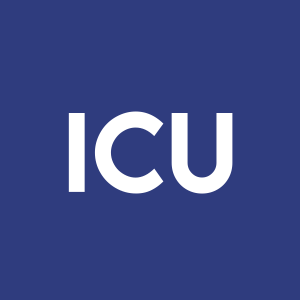SeaStar Medical Announces $3.6 Million NIH Grant Award to Study the Selective Cytopheretic Device in Adult Patients with Severe Chronic Heart Failure
SeaStar Medical Holding (Nasdaq: ICU) has been awarded a $3.6 million NIH grant for a clinical trial to evaluate the Selective Cytopheretic Device Adult (SCD-ADULT) in patients with severe chronic heart failure (CHF). The grant aims to study SCD-ADULT as a bridging strategy to left ventricular assist device (LVAD) implantation in patients with acute decompensated heart failure (ADHF). The company hopes this study will pave the way for FDA approval.
SeaStar Medical has been awarded a $3.6 million NIH grant for a clinical trial to evaluate the SCD-ADULT.
The grant aims to study SCD-ADULT as a bridging strategy to LVAD implantation in patients with acute decompensated heart failure.
The study could potentially lead to FDA approval.
There is a risk that the clinical trial may not yield positive results for the SCD-ADULT device.
There may be challenges in obtaining FDA approval for the device based on the trial outcomes.
DENVER, April 30, 2024 (GLOBE NEWSWIRE) -- SeaStar Medical Holding Corporation (Nasdaq: ICU), a medical device company developing proprietary solutions to reduce the consequences of hyperinflammation on vital organs, announces that the National Institutes of Health’s (NIH) National Heart, Lung, and Blood Institute has awarded a
With current standard of care treatment, ADHF can accelerate worsening renal function in a feedback loop known as cardiorenal syndrome, which is associated with a poor prognosis. These patients are often ineligible for lifesaving LVAD implantation due to the severity of their condition.
This grant was awarded to Innovative BioTherapies (IBT), which is led by SCD inventor H. David Humes, M.D., Professor, Division of Nephrology, Internal Medicine, University of Michigan and SeaStar Medical Scientific Advisor. SeaStar Medical is expected to directly receive approximately one-quarter of the grant for serving as the contract research organization for the trial, which can be leveraged for other indications. The trial is expected to enroll 20 ICU patients with ADHF at four sites who are ineligible for LVAD or cardiac transplantation in order to determine whether the SCD-ADULT can improve these patients’ condition such that they are able to bridge to LVAD implantation. If successful, this study could pave the way for a marketing application to FDA.
In February 2024, SeaStar Medical announced publication of a manuscript titled “New opportunity for targeting systemic inflammation in patients with heart failure through leucocyte immunomodulation” in the peer-reviewed European Journal of Heart Failure (Pitt, B., Iyer, S.P.N. and Humes, H.D.). The manuscript reviews the role of chronic dysregulated systemic inflammation in heart failure and the potential application of SCD-ADULT in enabling previously ineligible patients with severe disease to receive an LVAD or heart transplant. The NIH grant is based upon the first-in-human case study discussed in the manuscript, as well as improved cardiac contractility in a canine model of CHF following treatment with the SCD. Those results were published in the peer-reviewed journal PLOS One in April 2023, and also served as the basis for SeaStar Medical’s Breakthrough Device Designation for cardiorenal syndrome.
“Several other therapeutic agents tested in large prospective trials of patients with ADHF have demonstrated no clinically relevant efficacy outcomes and often had unacceptable adverse events,” said Dr. Humes. “In contrast, SCD therapy, which immunomodulates activated circulating leukocytes, represents a novel approach to treating cardiorenal syndrome that could address the critical limitation of other therapeutic strategies tested to date.”
“This grant will fund a single clinical trial that could support FDA approval of SCD-ADULT for ADHF,” said Eric Schlorff, SeaStar Medical CEO. “We are encouraged by the NIH’s support and appreciate Dr. Humes and his team’s oversight of this trial while we pursue the SCD-ADULT’s approval in adult acute kidney injury and evaluate additional applications in high-value, unmet medical needs where hyperinflammation plays a role.”
On February 22, 2024, SeaStar Medical announced the Humanitarian Device Exemption (HDE) FDA Approval Order for Quelimmune for use in children weighing 10 kilograms or more with acute kidney injury due to sepsis or a septic condition requiring kidney replacement therapy (KRT). SeaStar Medical also has an ongoing pivotal study evaluating treatment with the SCD in adults in the ICU with acute kidney injury.
About Hyperinflammation
Hyperinflammation is the overproduction or overactivity of inflammatory cells that can lead to damage of vital organs. It occurs when the body overproduces inflammatory effector cells and other molecules that can be toxic, damaging to vital organs, and result in multi-organ failure and even death. This is known as the cytokine storm.
About the Selective Cytopheretic Device
The Selective Cytopheretic Device (SCD) is a patented cell-directed extracorporeal device that employs immunomodulating technology to selectively target proinflammatory neutrophils and monocytes during continuous KRT (CKRT) and reduces the hyperinflammatory milieu including the cytokine storm that causes inflammation, organ failure, and possible death in critically ill patients. Unlike pathogen removal and other blood-purification tools, the device is integrated with CKRT hemofiltration systems to selectively target and transition proinflammatory monocytes to a reparative state and promote activated neutrophils to be less inflammatory. The SCD selectively targets the most highly activated proinflammatory neutrophils and monocytes. These cells are then returned back into the body through the blood, and the body is signaled to lower its inflammatory environment and focus on repair. This unique immunomodulation approach may promote long-term organ recovery and eliminate the need for future KRT, including dialysis. At this time Quelimmune is specifically branded for pediatric acute kidney injury (AKI).
About Innovative BioTherapies
IBT is a privately held biotechnology company founded to facilitate the commercialization of technology developed in Dr. H. David Humes’ academic laboratory. IBT’s research and development program is primarily supported by federal grants and contracts that focus on developing cell therapy devices utilizing human progenitor cells, biomimetic materials, and micro-electromechanical systems (MEMs) technology. More information is available at http://www.innbio.com/.
About SeaStar Medical
SeaStar Medical is a medical technology company that is redefining how extracorporeal therapies may reduce the consequences of excessive inflammation on vital organs. SeaStar Medical’s novel technologies rely on science and innovation to provide life-saving solutions to critically ill patients. The Company is developing and commercializing cell-directed extracorporeal therapies that target the effector cells that drive systemic inflammation, causing direct tissue damage and secreting a range of pro-inflammatory cytokines that initiate and propagate imbalanced immune responses. For more information visit www.seastarmedical.com or visit us on LinkedIn or X.
Forward-Looking Statements
This press release contains certain forward-looking statements within the meaning of the “safe harbor” provisions of the Private Securities Litigation Reform Act of 1955. These forward-looking statements include, without limitation, the SCD’s ability to treat hyperinflammation and the expected results of clinical trials and studies, including regulatory approval of SCD for ADHF. Words such as “believe,” “project,” “expect,” “anticipate,” “estimate,” “intend,” “strategy,” “future,” “opportunity,” “plan,” “may,” “should,” “will,” “would,” “will be,” “will continue,” “will likely result,” and similar expressions are intended to identify such forward-looking statements. Forward-looking statements are predictions, projections and other statements about future events that are based on current expectations and assumptions and, as a result, are subject to significant risks and uncertainties that could cause the actual results to differ materially from the expected results. Most of these factors are outside SeaStar Medical’s control and are difficult to predict. Factors that may cause actual future events to differ materially from the expected results include, but are not limited to: (i) the risk that SeaStar Medical may not be able to obtain regulatory approval of its SCD product candidates; (ii) the risk that SeaStar Medical may not be able to raise sufficient capital to fund its operations, including clinical trials; (iii) the risk that SeaStar Medical and its current and future collaborators are unable to successfully develop and commercialize its products or services, or experience significant delays in doing so, including failure to achieve approval of its products by applicable federal and state regulators, (iv) the risk that SeaStar Medical may never achieve or sustain profitability; (v) the risk that SeaStar Medical may not be able to access funding under existing agreements; (vi) the risk that third-parties suppliers and manufacturers are not able to fully and timely meet their obligations, (vii) the risk of product liability or regulatory lawsuits or proceedings relating to SeaStar Medical’s products and services, (viii) the risk that SeaStar Medical is unable to secure or protect its intellectual property, and (ix) other risks and uncertainties indicated from time to time in SeaStar Medical’s Annual Report on Form 10-K, including those under the “Risk Factors” section therein and in SeaStar Medical’s other filings with the SEC. The foregoing list of factors is not exhaustive. Forward-looking statements speak only as of the date they are made. Readers are cautioned not to put undue reliance on forward-looking statements, and SeaStar Medical assumes no obligation and do not intend to update or revise these forward-looking statements, whether as a result of new information, future events, or otherwise.
Contact:
LHA Investor Relations
Jody Cain
(310) 691-7100
Jcain@lhai.com
# # #

FAQ
What is the purpose of the $3.6 million NIH grant awarded to SeaStar Medical?
What is the goal of the study involving the SCD-ADULT device?







